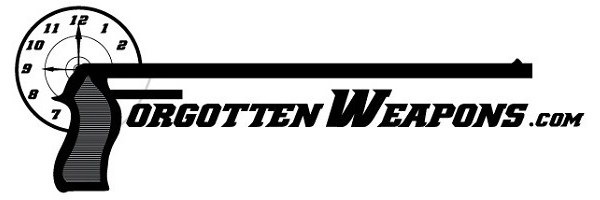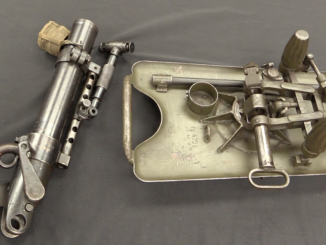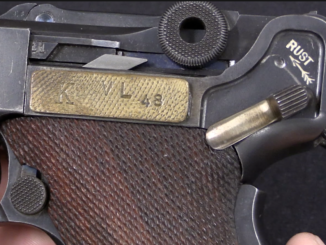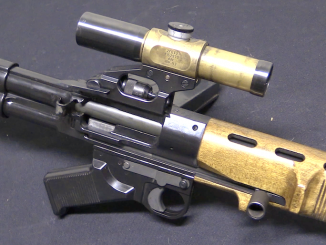Courtesy of Legacy Collectibles, we have a variety of pistols to look at today which were taken as souvenirs by American GIs when the Walther factory was captured in April of 1945. Walther was making PP, PPK, and P38 pistols right up until US soldiers walked in, and there were a wide variety of complete guns and miscellaneous parts accessible in the factory. Army forces secured the arms within a week or so of the town of Zella-Mehlis being captured, but by that time plenty of first-wave soldiers had take the opportunity to secure a trophy pistol (or several). These range from complete and proofed guns ready to ship out to major completed sub-assemblies put together (resulting in mismatched and unproofed guns) to complete dog’s lunch guns made of completely mismatched, unfinished, and reject parts put together by soldiers themselves or by factory workers in exchange for a few dollars or trade items.
To see more about Legacy, check out their YouTube channel.




What people do to make a buck in postwar depression doesn’t surprise me anymore. At least we get to see these as collector items that aren’t faked up.
True craftsmanship or workmanship in manufacturing seems to be belittled in much of our contemporary society, to the point that most younger folk who don’t go into technical fields seem to believe that computers and smart devices are made by monkeys pulling levers on stamping presses in ACME factories. Just kidding!
I don’t thank you for destroying the illusion !
My uncle was in a unit that occupied a factory making P-38’s, and told me the exact same story. He did not say whether or not it was the Walther factory, Mauser, or someplace else. They went in and started selling pistols to GI’s, and when they ran out, they started assembling them. Some worked, and some didn’t. He didn’t keep any- just money and booze. I regret not getting the details of the story- he died a long time ago.
I had heard they were called “cigarette guns”. Collect Walthers and it is on my list, but pretty far down the list. Not what would be called an important one.
Name comes from the GIs walking in, offering to trade a pack of Luckies for a full gun and the deal happened. My understanding was the plant was running as the GIs came through the front door, the workers running out the back. Next day, the workers came back and the dealing started.
Yesterday, they were working for the Reich Procurement and Walther. Today, they’re working for themselves.
“(…)Next day, the workers came back and the dealing started. (…)”
Interesting. But after some thinking I have idea why. If I am not mistaken, generally working in war-effort crucial plant during war prevented being drafted into military. If that was case I would suspect smart man trying to avoid being sent to front might use his skills or personal connections to get that job (naturally there is a chance of aerial bombing of plant, but it still seems safer place to be that front line) thus resulting in most of crew consisting of people able to care for themselves.
Cutting marks are quite revealing, like fingerprints for investigator. They show remarkable consistency which is testimony to excellent condition of machinery and tooling. Even the way the material resists cutting tells the its grade. All are top notch.
The glass piece shown bears remains of the word “Verkaufsstelle”, meaning a shop that sold Walther firearms.
“(…)captured in April of 1945(…)”
So, this is blatant example of acting against Führer order.
In March 1945 Hitler give following instruction titled Befehl betreffend Zerstörungsmaßnahmen im Reichsgebiet:
All military transport and communication facilities, industrial establishments and supply depots, as well as anything else of value within Reich territory, which could in any way be used by the enemy immediately or within the foreseeable future for the prosecution of the war, will be destroyed
https://en.wikipedia.org/wiki/Nero_Decree
Yeah, right. Then we can talk about cutting edge technology of the time. In 1.5 year after end of war, the USAF was testing German V2 ballistic missile.
https://www.youtube.com/watch?v=gSlGxlAusSE
Von Braun and other top development people were rather happy to end with their know-how in former enemy’s hands. What would Fuhrer say?!
“(…)Von Braun and other top development people were rather happy to end with their know-how in former enemy’s hands. What would Fuhrer say?!(…)”
W. von Braun was Nazi in true sense, that is member of NSDAP. Do not overlook fact that working for U.S.A., he was working against (communist) U.S.S.R. and communists were deemed enemy by NSDAP in 1930s. Thus enemy of my enemy rule might work there.
It is interesting how people switch ideologies for convenience. I could name one topmost Czech general who was until recently in head of NATO. Guess what? He, under circumstance became a different man, given the opportunity. His past was communist, just like many leading people in the country including prime-ministers and presidents. No one in West seem to have issue with that (and Communist party is still legal there!). Yet, we hear of “defeating communism”.
Btw. on top of Germany’s might, in spring of 1941 only 12.5 percent (1/8 of population) were members of NSDAP. Yet, the country is known as Nazi thru-out. Not fair to majority, is it? But so what, they took it as their own sin.
If you look at the video, towards the end, W.v.Braun (with cast on his left arm) is happy beyond himself as being taken to custody. Should we blame him for that?
That video is really well made; I recommend to view it.
I heard of this order applied to stolen artworks in the movie The Monuments Men. However, I doubt any German soldiers torched looted paintings. And if any Germans were caught burning the artwork, I’m very certain that Allied soldiers and local civilians would retaliate with great prejudice. As for munition factory workers selling souvenir guns to Allied troops, the workers probably thought to themselves that nobody was going to enforce the Nero Decree, since the “security guards” had either been killed or taken prisoner.
I have no reason to praise German soldiers for nothing since they were occupying force. But what I know from people who remembered the war, told me that the Germans, especially officers of Wehrmacht were the most honorable of all militaries in the area. Russians could not come even close, yet they were our “liberators”. Father told me that one Russian officer wanted to shoot him, because he was not keen to give him his bicycle. Go, figure!
I have a AC45 P-38 C block that is one of these guns complete with a D block barrel and Durafol grips.
Cigarettes were the de facto currency, both inside POW camps and outside.
The German currency collapsed to virtually zero purchasing power, twice, during the twentieth century, but, Once you had sufficeint cigarettes, you could use them to buy anything else that you wanted.
There’s a lovely paper by a former POW called Radford, published in 1945, that covers the economics inside POW camps, and how quickly cigarettes became the money.
The story of the recovery from the 1944-45 hyperinflation and the restoration of a market economy, and subsequent “German economic miracle” is even more fascinating.
It’s said that Ludwig Erhard, was called before the heads of the American and British occupation forces, and ordered to explain why he had altered the fixed prices and rationing system.
“I haven’t altered them, I’ve abolished them”
“Our Advisors tell us that this is very dangerous…”
“So do mine” Replied Erhard.
The British officers were furious, but impotant to do anything. Rationing had ended in the British and American occupied sectors of Germany, the black market disappeared and food and goods that hadn’t been seen for years, appeared for sale in the shops, but food Rationing continued in Britain until 1952.
This may sound little credible, but I recall reading somewhere that the market with life necessities was better in East Germany shortly after the war. The reason was that Russians did everything possible to prop-up that country’s market to make it look as “more successful model”. This was taken advantage of by swindlers who purchased large amount of goods and sold them for profit in western part of country. The final stop to this practise was made by Berlin Wall (of course there were other reasons for it too).
P.38 is the best gun in the world